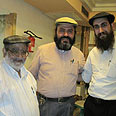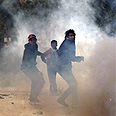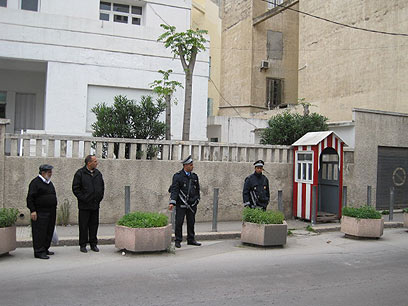

As a violent atmosphere takes over the country, members of the Jewish community explained that they have a good relationship with their Muslim neighbors and are affected by the recent unrest in the same way as the rest of the population.
Yet while they try to present a façade of business as usual, there were Jews who were fearful of being interviewed on the subject, or preferred not to identify themselves. "The stores are open, and everything is OK" the Rabbi of the Central Synagogue of Tunis and head of the Chabad house there, Benjamin Hatab stated.
Rabbi Hatab noted that since the riots began, community members have been shutting themselves in their homes from sunset to sunup the next day. Activities in the Jewish school where 1,000 children study, have been suspended in light of the ever present danger in the streets.
"People were beaten in the street and armed men were walking around with knives and weapons. A guard has been placed outside the Chabad house and synagogue. Yesterday we prayed there with a minyan and everything was fine. I think that the fact that people come for prayers proves that they aren't afraid."
Meanwhile, Djerba's ancient Jewish community members talk about the complete calm in their area. "It is quiet here at the moment; I'm sitting in a coffee shop having a drink with friends," said Chai Kamous, a member of the Jewish community. And yet, he adds that in spite of their distance from the events in Tunis, "everybody is talking about what happened, and especially, what will happen in the future."

Tight security around Tunis synagogue
Kamous says he isn't concerned about the safety of his family. "There is no fear at the moment. Even though everything is closed, people are still walking in the streets, talking, and not hiding away. In any case, the riots only occurred at certain locations and Djerba was certainly not among them. It is much calmer here."
As with Tunis' Jewish community, Djerba's community is also concerned about the future. "Everyone is distressed, Jews and non-Jews alike. We don't know what the future will bring; we are waiting to see what tomorrow has in store."
Call for help
In contrast to the low profile presented by the Jewish community, and the relative calm they are enjoying, those who were at the center of the riots drew a bleaker picture. Suhil Patuach, a human rights activist who took part in the ousting of President Zine El Abidine, spoke to Ynet from the heart of the Tunisian capital – just 500 meters from the parliament building.
"It's very dangerous here. Passersby are being shot at as we speak," he said. He noted that there is a major shortage of food, fuel and other essential commodities.
The fear that the governmental vacuum will be filled by Islamist factors does exist, but there has yet to be any intervention from those factors in current events. Suhil called on all free countries, including Israel to help Tunisians fight the corrupt regime for Tunisia's freedom. "Our interest was and remains to establish a democratic and incorruptible regime," Suhil added.
Israeli travelers break curfew
Meanwhile, a group of 21 Israeli travelers which managed to flee Tunisia landed at the Ben Gurion Airport Sunday. "It felt like a box of explosives set to detonate any minute," one traveler said, "but the Tunisians took great care of us."
"It was unpleasant, we felt nervous," Chaim Omer said. "On the third day, the road was filled with army roadblocks and once guns were even drawn at us and at a Libyan convoy. The TV footage reminded me of Gaza. It was meant to be an extreme travel experience but it turned into one of panic and escape."
Despite the chaos the organizers kept their composure, Omer said. "They got us out safely. We had a Tunisian representative on our bus who served as a translator and told us his mission was to see us safe out of Tunisia. I'm glad to come home and I'm certain that things will calm down again because Tunisia is an amazing country which seeks democracy."
Doron Lieber recounted one intimidating incident. "They changed the curfew to 8 pm without us knowing and that's why we got detained on the way to the hotel."
Menachem Abadi, the group's guide provided more details. "The army was the tricky part, it consists of young guys, very stressed out, who are not used to dealing with these situations. They had their fingers on the trigger and their weapons unlocked. I was very worried a bullet might be discharged.
"That's why the first thing we did was not enter into contact with the officers and soldiers since they were the problematic elements. Otherwise, it could have ended very badly. On the night we were detained, for the first 4-5 hours they lined us up and pointed their weapons at us. They wouldn't let us out of the bus under any circumstance.
"We started sweetening them up. First, it was important that we get off the main road and then we also managed to get out of the bus for a while. We managed to talk to the commander and convinced him to send us military escort. They knew we were Israelis and said they loved and respected the Israelis. We were taken to a side road and put up in a crummy hotel with military security. The next morning we left for Djerba on the main road and caught a flight to Israel."
Boaz Fyler contributed to this report
- Follow Ynetnews on Facebook















